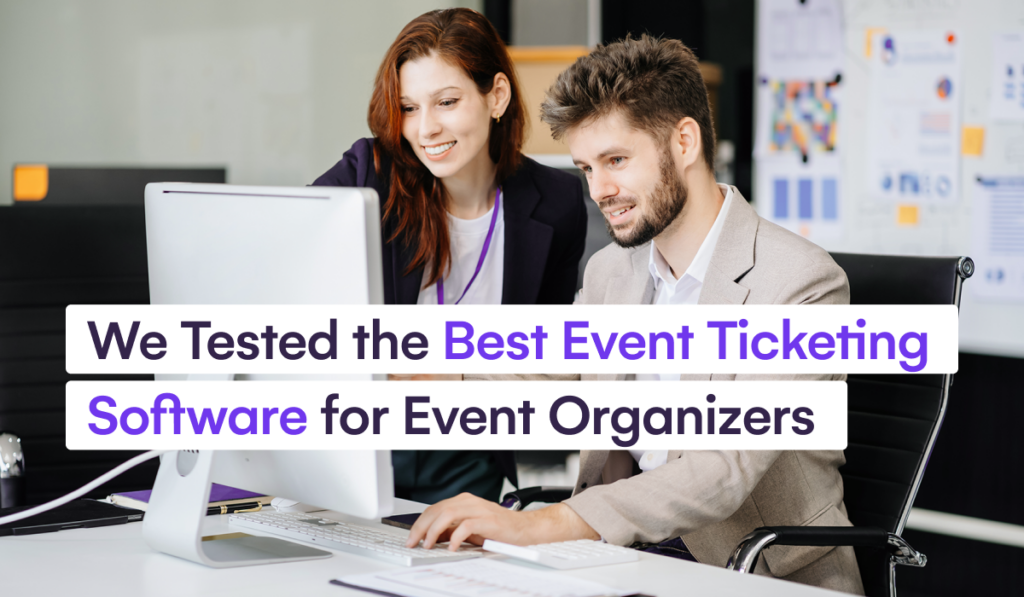We Reviewed 10 of the Best Cvent Alternatives for 2025

Cvent is the second most popular event management software by market share. And when you narrow the focus to all-in-one event management software, Cvent takes the top spot. But popularity doesn’t necessarily mean Cvent is the best choice for you.
In this EventsAir guide, we dive into a few of the reasons why people look for Cvent alternatives and then give you a list of ten of our favorite options.
Why look for Cvent alternatives?
- Disjointed Features: Cvent is a collection of integrated tools. Many users feel that these integrations aren’t as deep as you might expect from a native solution. Alternatives like EventsAir offer a comprehensive and native solution.
- Difficult to Use: One thing we see a lot of reviewers mention is the amount of time it takes to learn and then use Cvent. They also point to the unintuitive UI and the need for more reliable, comprehensive self-service resources.
- Poor Sales & Support Experience: Poor interactions with support and sales are pretty sources of negative reviews. Many reviewers feel the sales team upsells unnecessary features, and support can be unresponsive at crucial moments.
5 Cvent alternatives on the market
- EventsAir
- Eventbrite
- vFairs
- RingCentral Events
- Stova
- SpotMe
- EventX
- Bizzabo
- Eventzilla
- PheedLoop
1. EventsAir
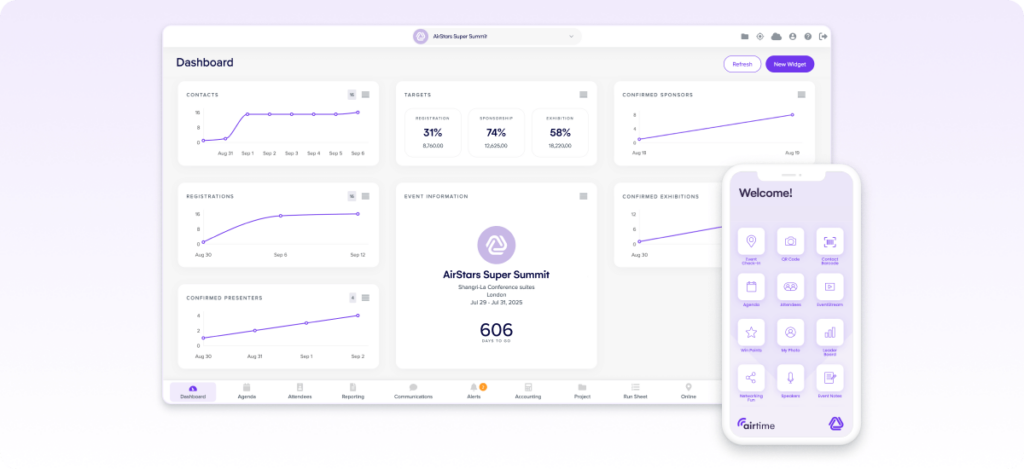
EventsAir is a comprehensive event management platform for professional event planners. With over 30 years of experience and 350,000+ successful events, we’ve earned a reputation for reliability and innovation in the industry.
Our feature set is truly end-to-end. We offer support for planners and organizers at every stage of the process, from seamless event branding and registration to robust data management and deep analytics.
Key Features
- End-to-End Planning: Handles all aspects of event management, from registration and attendee management to on-site services and post-event analytics.
- Customizable Event Websites: Allows the creation of branded, responsive event sites with a drag-and-drop interface.
- Built-in Budgeting and Accounting: Features tools for creating budget scenarios and real-time tracking of income and expenses.
- Event Reporting and Analytics: Provides over 150 customizable reports to gain insights into event performance.
- Virtual, In-Person & Hybrid Event Support: Offers tools to create immersive virtual experiences with customizable 3D environments.
- Custom Event Apps: Facilitates the design and deployment of event apps for desktop and mobile devices.
Pricing
EventsAir offers three main pricing packages—Single, Multi, and Unlimited.
The Single plan starts at a base price for managing one event, while the Multi plan is designed for organizations hosting 3+ events each year. The Unlimited package allows for unlimited events, users, registrations, and more.
Looking for a demo or quote? Reach out to sales—we’ll be happy to help you find the best package for your needs.
Pros and Cons
Pros
- Easy-to-use interface for planners, attendees, sponsors, etc.
- Tons of customization and branding options for event apps
- Feature set supports end-to-end event management
- Excellent reporting and event analytics
Cons
- No publicly available pricing
2. Eventbrite
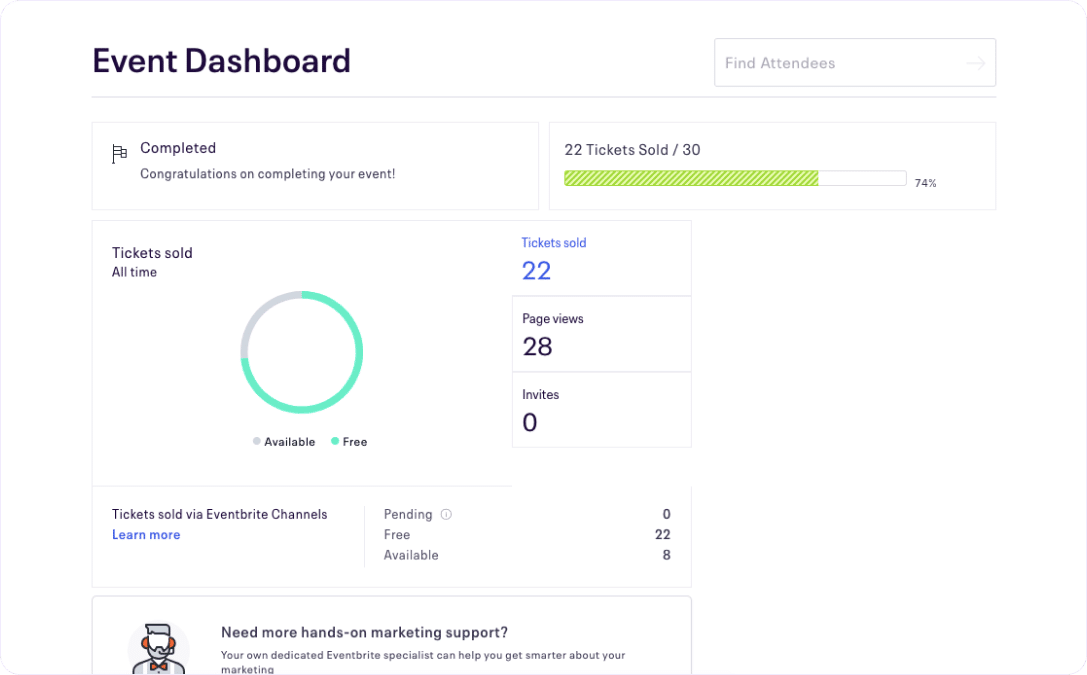
Eventbrite is a well-known event discovery platform that has been adding more and more event management features in recent years. While the focus is still on monetization rather than end-to-end event management tools, there is now a suite of attendee management, event marketing, and analytics features as well.
Key Features
- Basic Event Management: Centralizes some planning tasks like event creation, ticketing, and attendee management.
- Powerful Marketing and Promotion Tools: Boosts event visibility thanks to Eventbrite’s discovery platform and integrated marketing tools.
- Mobile Event Management: Streamlines on-site operations with an app for efficient check-ins, ticket sales, and real-time guest list updates.
Pricing
Eventbrite offers three flexible plans.
The Flex plan is free for up to 25 tickets, while the Pro plan costs $29 per month and allows unlimited events with support for up to 100 tickets per event. For larger event organizers, the Partner plan offers custom pricing based on specific requirements.
Pros and Cons
Pros
- Easy to set up and manage events
- Great promotional tools and marketplace listing
- Competitive pricing, especially for smaller events
Cons
- Basic customization options for event pages
- Ticket processing fees can be relatively high
3. vFairs
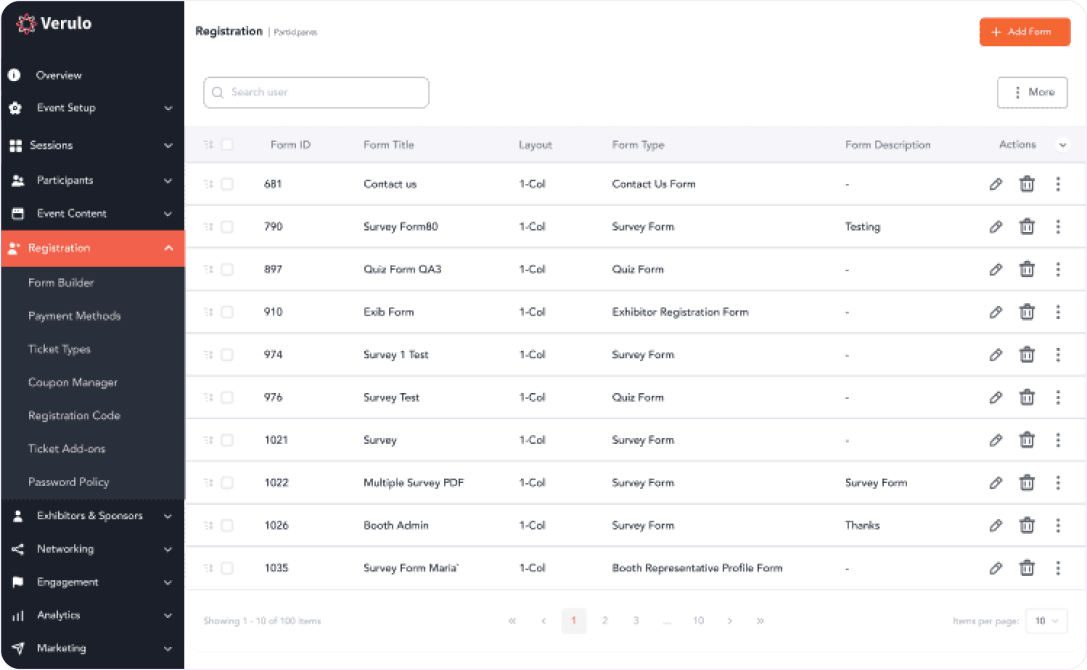
vFairs is a versatile event management platform known for its robust capabilities in hosting both virtual and hybrid events. It provides a comprehensive suite of tools designed to enhance attendee engagement, streamline event operations, and deliver immersive event experiences.
Key Features
- Badge Printing and Check-In: Offers on-site badge printing and streamlined check-in processes.
- Virtual Environments: Includes virtual exhibit halls and environments for engaging online events.
- Networking Tools: Provides networking opportunities through matchmaking and live interactions.
Pricing
vFairs offers customized pricing plans, so you’ll need to contact sales for details.
Pros and Cons
Pros
- Lots of customization options
- Nicely integrated features create a smooth user experience
- Great support
Cons
- Issues scaling with large events
- Setup and customization can take time
4. RingCentral Events

RingCentral Events is a platform for hosting virtual, hybrid, and in-person events. If it looks familiar to Hopin Events users… that’s because it is Hopin Events. RingCentral acquired Hopin Events years ago and integrated it into its growing communication software platform.
Key Features
- Live Streaming & Webinars: Supports high-quality live streaming and interactive webinars for virtual events.
- Integrated AI: Quickly draft event page copy, sponsor emails, and more with the help of integrated AI tools.
- Engagement Tools: Engage attendees with chat, polls, Q&A sessions, and a range of gamification options throughout the event.
Pricing
RingCentral Events offers bespoke pricing that begins at $750 per year for 100 attendee events.
Pros and Cons
Pros
All-in-one event management
- Decent customization options
- Great integrations with other RingCentral products
Cons
- Occasional glitches during high-traffic periods
- Some modules (like email marketing) are unintuitive
5. Stova
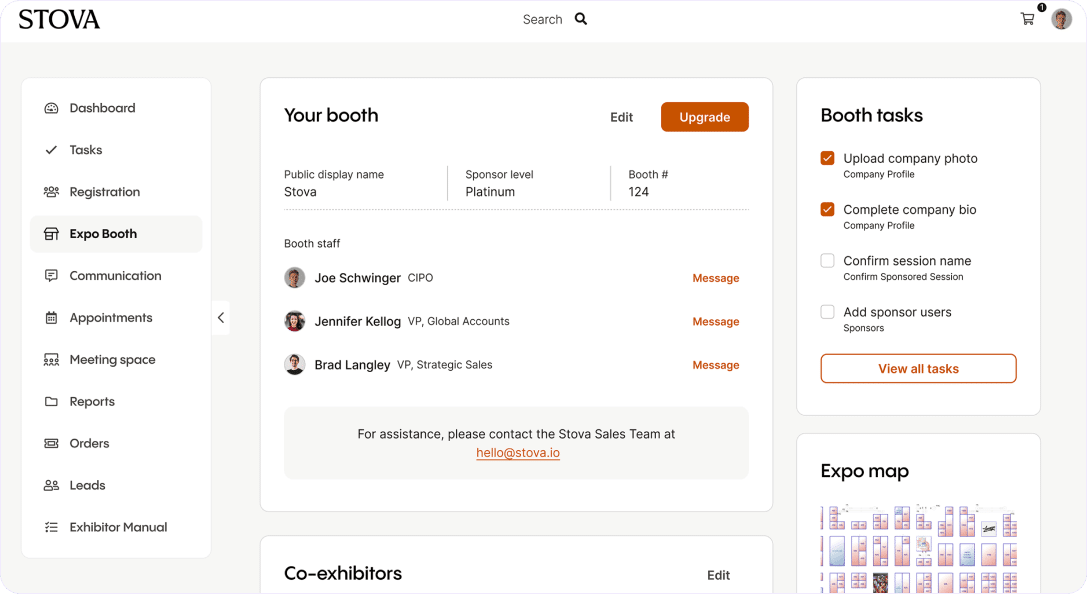
Stova is a comprehensive event management platform designed to help event organizers plan, manage, promote, and execute events of all sizes. The platform is used globally by over 1,200 organizations, including Fortune 500 companies and government agencies.
Key Features
- Venue Management: Tools for selecting and managing event venues.
- Event Marketing: Comprehensive tools for promoting events, including email campaigns and social media integration.
- Data Analytics: Robust reporting and analytics to track event performance and ROI.
Pricing
Stova does not publicly list its pricing, and there is no free trial or freemium version.
Pros and Cons
Pros
- Versatile for in-person and virtual events
- Highly customizable event experiences
- Robust reporting and analytics
Cons
- Feature-rich interface can be overwhelming
- Higher pricing than some competitors
6. SpotMe
SpotMe is a virtual and hybrid event platform that specializes in enterprise-level events.
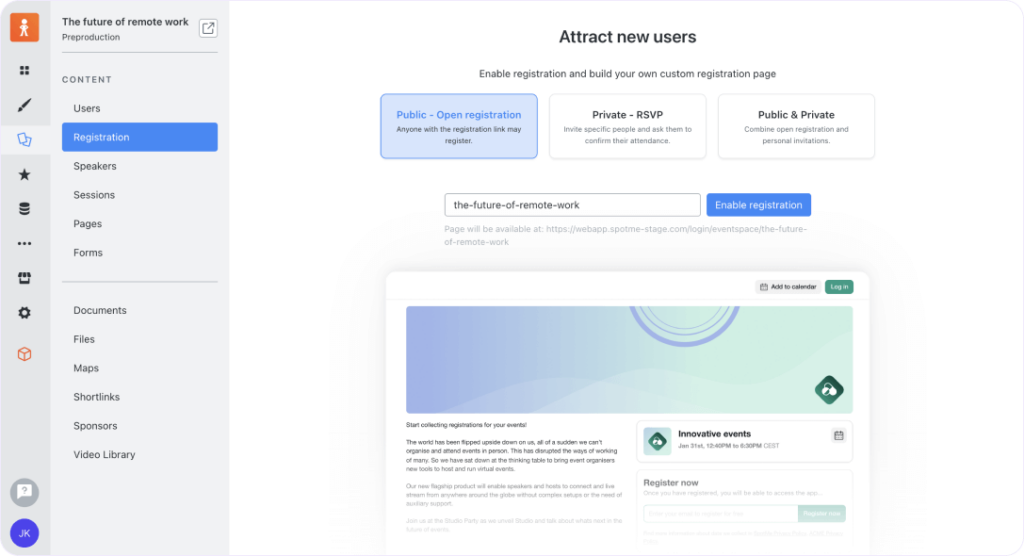
While newer to the market than some competitors, it has quickly gained traction with Fortune 500 companies, particularly in industries like life sciences and professional services where compliance and security are crucial.
Key Features
- Custom Mobile Apps: Create fully branded event apps that work across all devices, with built-in networking and engagement tools
- Live Engagement Suite: Run interactive sessions with polling, Q&A, and chat features that keep attendees involved
- Advanced Analytics: Track attendance, engagement, and ROI with detailed reporting tools
Pricing
SpotMe offers tiered pricing with four main packages. Reach out to their sales team for specific pricing, as it varies based on features and number of events. They do offer a free trial for testing the platform.
Pros
- Excellent for enterprise and regulated industries
- Strong mobile app capabilities
- High-quality video streaming
- Good analytics for measuring ROI
- Reliable technical support
Cons
- Higher price point than many competitors
- Can be complex to set up initially
- More features than smaller events might need
7. EventX
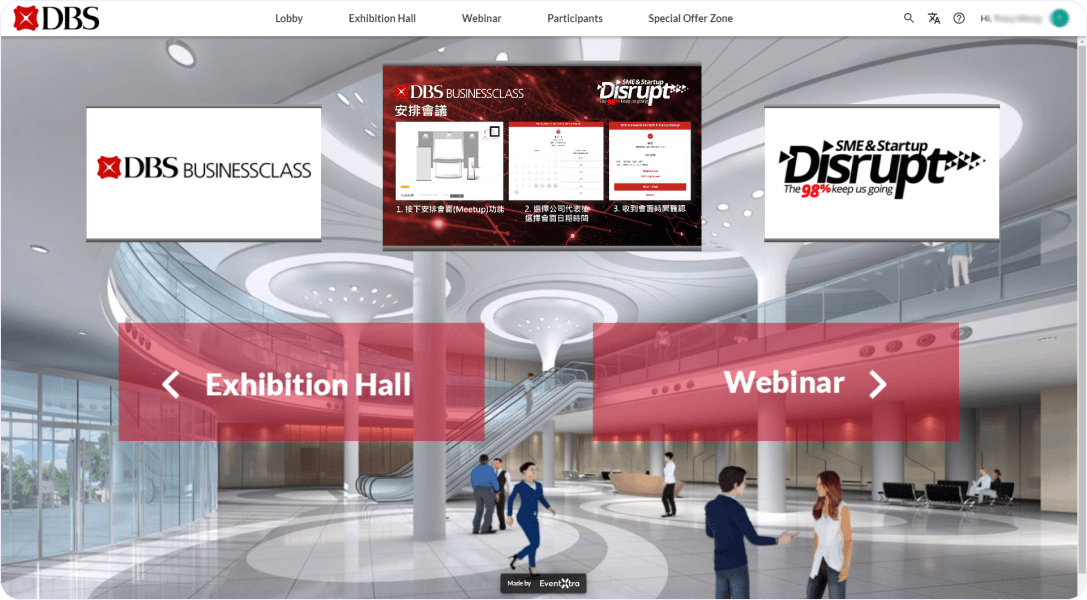
EventX has carved out a strong niche in the Asia-Pacific event market, making it an especially good choice for organizations hosting events in that region. The platform combines virtual and hybrid event capabilities with strong attendee engagement features and localized support.
Key Features
- Virtual Exhibition Tools: Create engaging virtual booths and exhibition halls where sponsors can showcase their offerings.
- Multi-Language Support: Run events in multiple languages with real-time translation options.
- Local Payment Integration: Accept payments through regional gateways popular in Asia, including WeChat Pay and Alipay.
Pricing
EventX uses a flexible pricing model based on event size and features needed. Contact their sales team for a custom quote that matches your requirements.
Pros
- Strong presence and support in Asia-Pacific
- Built-in translation and localization features
- Good virtual networking capabilities
- Reliable streaming even with regional internet variations
- User-friendly interface for attendees
Cons
- Limited integration options outside Asia
- Some features still being developed for Western markets
- Documentation mainly focused on APAC region
8. Bizzabo
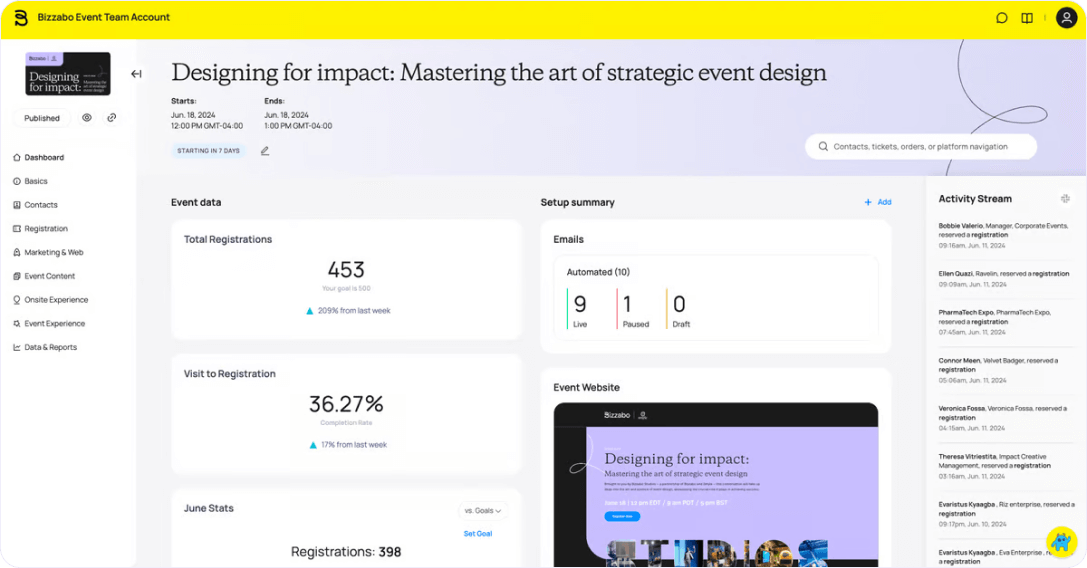
Bizzabo has made a name for itself by offering a unified platform that works equally well for in-person, virtual, and hybrid events. It’s particularly strong in combining event marketing with actual event management, making it popular with marketing teams who want to drive attendance and engagement.
Key Features
- Event Website Builder: Create fully branded sites with a no-code editor that integrates registration and agenda management
- Marketing Suite: Built-in email marketing, social media tools, and promotional features to drive registrations
- Analytics Dashboard: Track everything from ticket sales to session attendance with a detailed reporting tool.
Pricing
Bizzabo starts at $499 per user monthly with annual billing, and requires a minimum of 3 users.
Pros
- Strong marketing and promotion tools
- Excellent mobile app experience
- Good integration with major CRM platforms
- Robust networking features
- Clean, modern interface
Cons
- Higher pricing than some competitors
- Website builder can be limiting without custom code
- Support can be slow during peak hours
9. Eventzilla
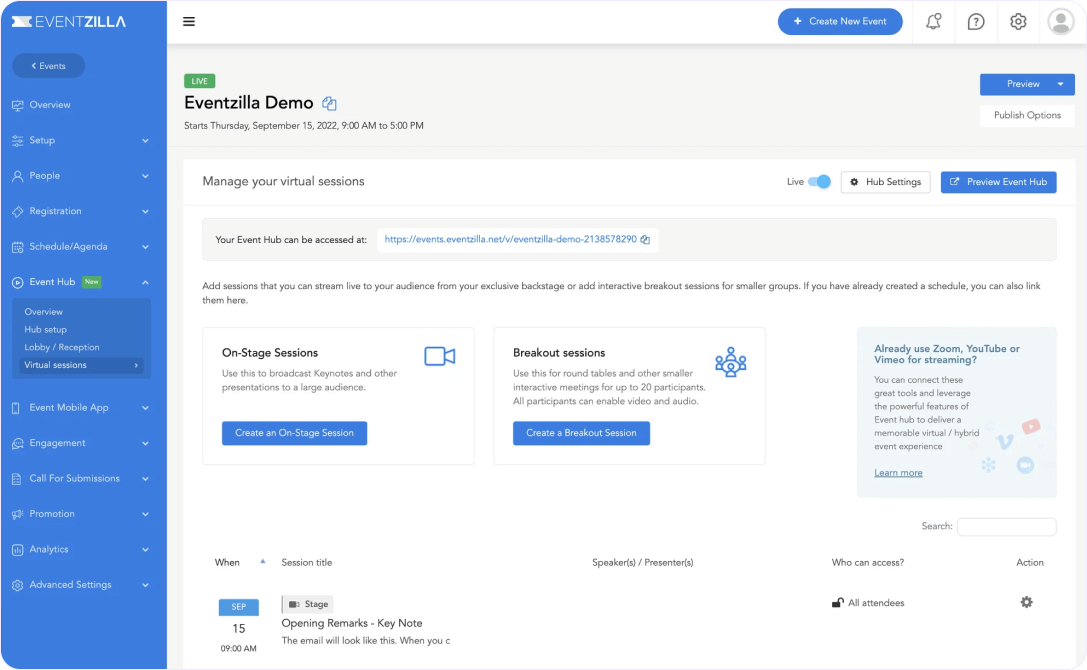
Eventzilla stands out in the event management space by focusing on simplicity and affordability. It’s particularly well-suited for smaller organizations and those running recurring events who need straightforward ticketing and registration without the complexity of enterprise platforms.
Key Features
- Flexible Ticketing System: Set up multiple ticket types, early bird pricing, and custom discount codes.
- Mobile Check-in: Streamline event entry with a mobile check-in app and QR code scanning.
- Registration Forms: Create custom registration forms that capture exactly the information you need.
Pricing
Eventzilla offers several flexible plans:
- Basic Plan: $1.50 per registration – perfect for small events and first-time organizers
- Pro Plan: 1.9% + $1.50 per registration – great for growing events needing more features
- Plus Plan: 2.9% + $1.50 per registration – ideal for events with advanced needs (most popular)
- Custom Plan: Flexible pricing options for events with comprehensive requirements
Pros
- Simple, straightforward platform
- Easy to set up and use
- Good basic feature set
- Built-in marketing tools
- Reliable customer support
Cons
- Limited customization options
- Basic analytics compared to competitors
- Fewer integration options
10. PheedLoop
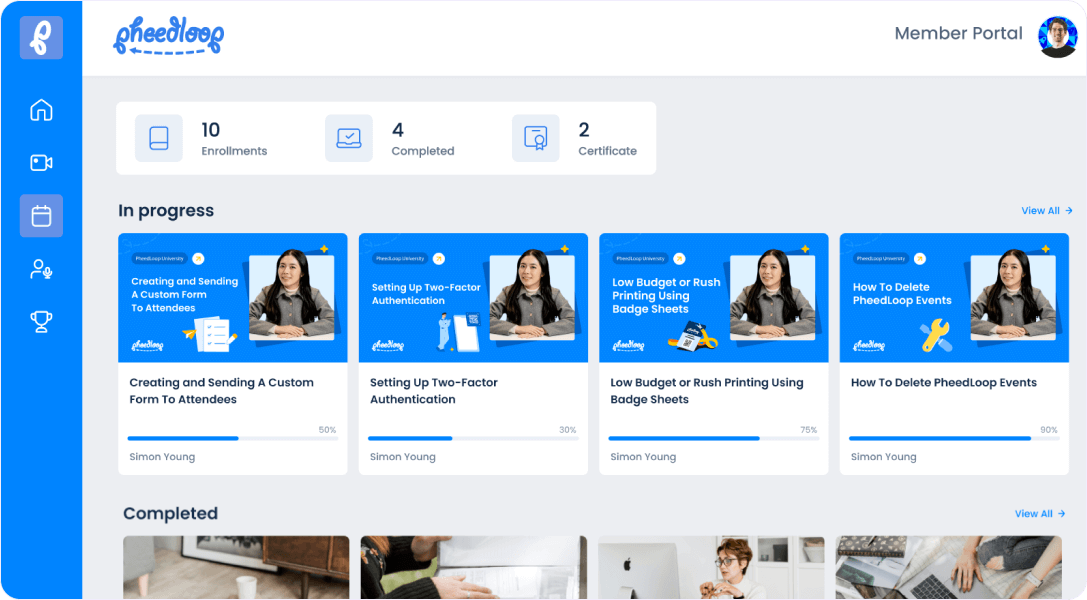
PheedLoop takes a modular approach to event management, focusing on conferences and trade shows. The platform stands out for its strong exhibitor management tools and ability to handle complex virtual and hybrid environments.
Key Features
- Interactive Attendee Engagement: Incorporates real-time chat, polls, and Q&A sessions to foster interactive participation during events.
- Exhibitor and Sponsor Portals: Provides dedicated portals for exhibitors and sponsors to manage their profiles, interact with attendees, and track leads.
- Event Website and Mobile App: Automatically generates customizable event websites and mobile apps, ensuring consistent branding and easy access to event information.
Pricing
PheedLoop offers modular pricing based on the components you need:
- Virtual Events: Starting at $3,000 per event
- Hybrid Events: Starting at $5,000 per event
- On-Site Tools: Additional fee based on attendee count
- Enterprise: Custom pricing for organizations with multiple events
Pros
- Strong exhibitor and sponsor features
- Good video streaming quality
- Flexible modular pricing
- Helpful onboarding process
- Solid virtual networking tools
Cons
- Higher starting price point
- Can be complex to set up
- Mobile app needs improvement
Conclusion
When choosing an event planning tool, it’s essential to consider your unique needs and budget. While Cvent is a powerful option, many alternatives may better suit your requirements.
EventsAir in particular shines thanks to a user-friendly interface, extensive support, and comprehensive feature set that’s fully native (unlike Cvent’s). Whether you’re hosting a virtual event or a large conference, EventsAir offers the tools you need to succeed.
Want to learn more? Reach out to sales to schedule a demo and see EventsAir in action.

